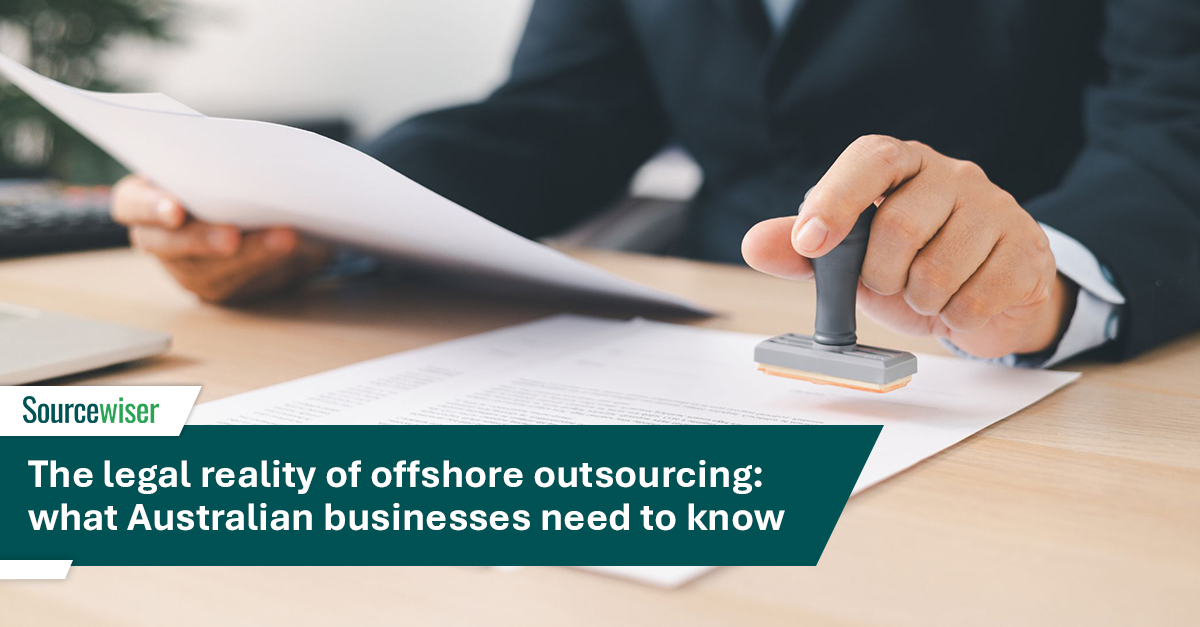The global eCommerce boom shows no signs of slowing - in the U.S., digital sales continue to surge: in Q2 2025, retail e-commerce sales rose 5.3% year-on-year, accounting for 16.3% of all retail sales. Meanwhile in Australia, eCommerce is also thriving: online shopping is projected to hit AUD 58 billion in 2025, up 5.2% from the previous year. What’s clear is that eCommerce is not just growing fast - it’s reshaping the global economy.
This rapid expansion presents both opportunity and complexity for retailers, who must balance rising customer expectations with leaner operations and tighter margins. Increasingly, outsourcing is becoming part of the answer - no longer viewed as just a cost lever, but an accelerator of innovation, resilience and global agility. This blog examines the emerging trends, opportunities and risks redefining eCommerce outsourcing - critical insights for retailers navigating this dynamic landscape.
Emerging trends in eCommerce outsourcing
The outsourcing landscape is shifting rapidly as technology and customer expectations reshape retail operations. In 2025, several trends are standing out as the most influential for eCommerce businesses.
AI-augmented operations
Artificial intelligence (AI) and automation are now integral to retail operations. As of 2025, nearly 89% of retailers are using AI daily or piloting projects, with the global AI in eCommerce market projected to reach USD 9 billion this year.
Omnichannel as the default
Seamless multichannel experiences are increasingly table-stakes. Over 70% of brands now consider omnichannel campaigns critical for long-term growth and customers who engage via multiple channels have up to 287% higher purchase rates.
Flexible engagement models
The rigid contracts of the past are giving way to on-demand, subscription or value-based outsourcing. This reflects retailers’ need for agility in uncertain markets, allowing them to scale teams up or down as customer demand changes.
Customer experience as a core metric
Outsourcing is moving beyond logistics to include CX strategy, personalisation and post-purchase care. Providers who can influence loyalty and lifetime value are becoming strategic partners.
Together, these trends reflect a clear evolution: outsourcing is no longer about filling operational gaps but about enabling smarter, more resilient growth strategies for retailers.
Opportunities ahead in eCommerce outsourcing
For retailers prepared to embrace outsourcing as a strategic enabler, the potential benefits in 2025 are significant. These include:
Scalability without structural burden
Outsourcing makes it possible to expand capacity quickly without committing to long-term fixed costs. Retailers can test new product categories, launch into fresh markets or manage seasonal spikes without the delays and expense of hiring in-house teams.
Specialised expertise
Access to skills like digital marketing, data analytics and customer support gives retailers a competitive edge. Outsourcing opens doors to talent that may be scarce locally, accelerating innovation without the overhead of building niche capabilities internally.
Global coverage
With outsourced teams operating across time zones, brands can deliver near-instant customer service, order fulfilment and marketplace responsiveness. This “always-on” capability reduces cart abandonment and enhances customer satisfaction.
Cost optimisation with strategic value
While outsourcing continues to deliver significant cost savings, the bigger opportunity lies in the efficiency and innovation it creates. The right partner not only lowers expenses but also improves customer experience and operational agility.
These opportunities show that outsourcing can be a catalyst for scale and innovation, provided retailers select the right roles and partners to align with their goals.
Risks to manage in eCommerce outsourcing
Despite its advantages, outsourcing comes with challenges that retailers must anticipate and mitigate. Ignoring these risks can undermine customer trust and long-term sustainability.
Data and compliance
With regulations tightening globally, mishandling customer data or failing to meet compliance standards can lead to significant financial and reputational damage. Retailers must ensure their partners have enterprise-grade security protocols and strong governance frameworks in place.
Cultural alignment
Outsourced teams interact directly with customers in many cases. Without cultural fit and proper training, miscommunication or inconsistent tone can harm customer experience. Providers that prioritise cultural onboarding and retention strategies mitigate this risk.
AI overreach
Automation delivers efficiency, but over-automating customer interactions risks creating impersonal or frustrating experiences. Retailers need to strike the right balance between human empathy and AI speed to preserve trust and loyalty.
By addressing these risks early, retailers can turn outsourcing into a resilient growth lever rather than a potential vulnerability.
The strategic imperative for retailers
With both opportunities and risks on the table, the real question is how retailers can make outsourcing a deliberate, future-focused capability. The future of eCommerce outsourcing is as much about resilience as it is growth. For retailers, the challenge is to think beyond cost-saving and instead ask:
-
How can outsourcing strengthen our customer experience?
-
Which skills or functions are best delivered through external expertise?
-
How do we design outsourcing models that flex with our growth trajectory?
Those who approach outsourcing as a strategic capability, not a transactional service, will be best positioned to thrive in 2025’s competitive retail landscape.
Shaping the future
Outsourcing in eCommerce is entering a new chapter - one defined by agility, intelligence and customer-centricity. For retailers, the task ahead is not simply to outsource, but to outsource wisely: selecting the right partners, embedding resilience and keeping the customer at the centre.
Want to dive deeper into how eCommerce outsourcing could work for your business? View our free guide: 10 functions you can outsource to grow your eCommerce business. It highlights practical areas where outsourcing can create immediate impact and long-term scalability.




